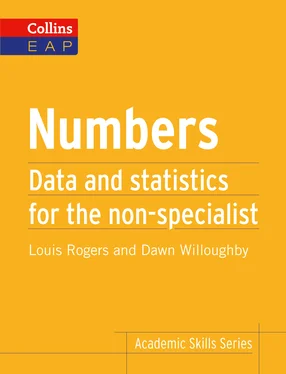Glossary
censusA census is an official survey of the population of a country that is carried out in order to find out how many people live there and to obtain details of such things as people’s ages and jobs.
sampleA sample of people or things is a number of them chosen out of a larger group and then used in tests or surveys, or used to provide information about the whole group.

Exercise 5
For the investigations listed in the table below, describe the population and decide if it would be practical or impractical to carry out a census to find out information on the whole population.
| Investigation |
Sample population |
Census: practical or impractical? |
| 1Finding out how many hours of homework are completed each week by the pupils in a specific class in a school. |
|
|
| 2Finding out the number of pets that are owned by adults in London. |
|
|
| 3Finding out the number of pages in each book in a large library. |
|
|
| 4Finding out how many children in the UK walk to school in the morning. |
|
|
Using sample data, you can only draw conclusions and make estimates about the entire population if you choose a sample of things or people that represents the whole population fairly. If your sample is not representative of the population, then it is known as a biased sample.
The table below describes some samples taken for different investigations, and explains why these samples are not representative of the population. Can you work out why the sample is biased for the last two investigations?
Glossary
biasedIf someone is biased, they prefer one group of people to another, and behave unfairly as a result. You can also say that a process or system is biased.
| Investigation |
Sample |
Why the sample is biased |
| The value of all houses in Bristol |
Houses in one street in Bristol |
Houses in the same street are likely to be similar in size, so the sample only fairly represents that street rather than all the houses in Bristol, which will vary considerably in size and therefore in value. |
| The favourite football team of men aged 20–40 in the UK |
Men aged 20–40 who go to a football match between Manchester City and Manchester United in February |
|
| People’s opinion about whether driving a car is the best way to travel to work |
Drivers who have just parked their car in a company car park |
|
Tip
 Ask someone else to look at your planned sample before you start your research and ask them if they can see any bias. It can be difficult to look at it objectively yourself, so help and guidance will be useful here.
Ask someone else to look at your planned sample before you start your research and ask them if they can see any bias. It can be difficult to look at it objectively yourself, so help and guidance will be useful here.
Exercise 6
Match the words or phrases on the left to a definition on the right.
| 1carry out |
athe group you want to investigate |
| 2investigation |
ba study of the whole group |
| 3population |
cto do a particular piece of work, research, etc. |
| 4census |
dnot giving a fair representation of the entire population |
| 5sampling |
etypical of people or things in a particular group |
| 6draw a/the conclusion |
fthe process of trying to discover all the details or facts about something to discover who or what caused it or how it happened |
| 7estimate |
gto say what you think an amount or value will be, based on the available information to calculate it |
| 8bias |
hto decide what to believe about something after you have considered the facts |
| 9representative |
Ithe process of selecting part of the whole population for your investigation |
Exercise 7
Complete these sentences with words from Exercise 6. You may need to change the form of some words.
1The sample was not large enough to be ________of the whole population.
2Poor ________meant that it was difficult to draw conclusions.
3The study was ________over a three-month period.
4The study aimed to ________the effects of advertising on children.
5The sample was ________towards middle aged men.
6The ________net spend per month was £500.
7A national ________is carried out in the UK every few years.
8The ________under investigation was international students in the UK.
9We can ________the ________that advertising has a significant impact on children’s spending patterns.
A hypothesis is something that you plan to test in your research and is related to forming your research question. The hypothesis usually states that something will or will not happen. It is something that you would write before starting your research; you plan to see if it is true or not after doing your research.
Glossary
constructIn the area of research, a construct is an idea, belief, or subject which is based on evidence which may not be true, and which you want to test and measure.
objectivelyIf you look at something objectively, you base your opinions on facts rather than on your personal feelings.
Examples of hypotheses:
Language is the main challenge in adapting to another culture.
 Low income is the main reason for job dissatisfaction.
Low income is the main reason for job dissatisfaction.
Blueberries have a positive impact on the mind.
Each of these hypotheses is formed from two or more constructs and often makes a claim for cause and effect. For example:
| Cause |
Effect |
| language ability |
ability to adapt to another culture |
| income level |
job satisfaction |
| consumption of blueberries |
impact on the mind |
A construct is something that can be tested or questioned objectively. For example, in the first hypothesis above we could ask:
How can culture be defined?
How can adaptation be measured?
What factors affect adaptation?
How are language and culture related?
Does language impact on adaptation?

Exercise 8
What is the purpose of a hypothesis and what should it clearly state?
Exercise 9
Look at the other two hypotheses from the previous page. What questions could you ask yourself about these hypotheses?
Читать дальше


 Ask someone else to look at your planned sample before you start your research and ask them if they can see any bias. It can be difficult to look at it objectively yourself, so help and guidance will be useful here.
Ask someone else to look at your planned sample before you start your research and ask them if they can see any bias. It can be difficult to look at it objectively yourself, so help and guidance will be useful here. Low income is the main reason for job dissatisfaction.
Low income is the main reason for job dissatisfaction.










